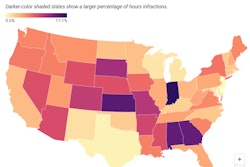Trucking news and briefs for Friday, April 16, 2021:
Liability insurance minimum increase legislation reintroduced
A bill that would tie truck owners’ minimum liability insurance requirements to medical care inflation has been reintroduced in the U.S. House.
Rep. Jesus “Chuy” Garcia (D-Illinois) first introduced the legislation, dubbed the “Improving National Safety by Updating the Required Amount of Insurance Needed by Commercial Motor Vehicles per Event (INSURANCE) Act” in 2019, but it never advanced past the House Transportation Committee.
While the text of the reintroduced bill is not yet available, the original bill called for motor carriers’ minimum insurance levels to be raised from $750,000, based on medical-cost inflation.
According to the language of the 2019 bill, the amount of $750,000, which was set as the insurance minimum in 1980, would have had the same buying power as $4.9 million in 2019, based on medical-cost inflation.
The bill would also require the Department of Transportation to adjust the liability minimum every five years.
The Owner-Operator Independent Drivers Association and other trucking groups have long been opposed to increasing the insurance minimum for motor carriers. More than 60 trucking-related organizations penned a letter in February to the House Committee on Transportation and Infrastructure to discourage any attempts to increase the minimum.

“Increasing the liability requirement will not make highways safer, is wholly unnecessary and would have a severe negative impact on small-business truckers, farmers and manufacturers,” OOIDA said in a statement Friday morning.
The Truck Safety Coalition and trial lawyer group American Association for Justice are among groups that have voiced support for Garcia’s INSURANCE Act.
[Related: Congress eyes trucking insurance changes, mandating automatic emergency braking]
Diesel Laptops, Dorman collaborate on engine fault-code reader
The Dorman Products and Diesel Laptops companies announced a new device designed to plug into the truck's diagnostic port to transmit detailed information to a user's smartphone for reading/interpretation. The smartphone app (available for both Apple and Android devices) making the system work is free, and the entire package is called the Diesel Decoder. It's designed to read true system diagnostic trouble codes (DTCs), including manufacturer-specific fault codes, as well as connect directly to the Diesel Laptops knowledge base to identify required repairs.
"We believe it's truly a game changer for our industry to have an affordable and powerful device like this that can read true fault codes, from virtually all electronic control modules, on virtually all North American heavy duty truck makes and models," said Tyler Robertson, CEO of Diesel Laptops. "We believe this is the first mobile diagnostic tool that can get users from fault code to repair information in minutes."
Flatbed, reefer fleet announces pay increase, new equipment
Gary, Indiana-based AFC Transport is rewarding its company drivers with new equipment and the company’s biggest pay increase in its history.
For flatbed drivers, the 160-truck fleet is raising pay from 55 cents per mile to 60 cents per mile. Pay for reefer drivers is increasing from 51 to 55 cents per mile. Drivers can also choose to be paid a percentage of the total gross pay for each load.
In addition to the pay increase, AFC has also purchased more than 60 new trucks, including new Peterbilt 579, 567 and 389 trucks equipped with Cummins engines, and new Reitnouer flatbed trailers.









